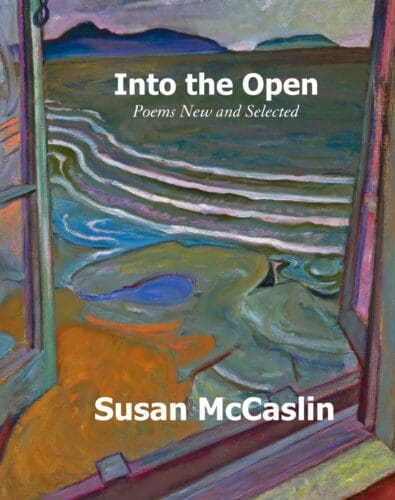REVIEW: INTO THE OPEN: POEMS NEW AND SELECTED | BY SUSAN MCCASLIN
Inanna Publications | September 2017 | 384 pages | $22.95 | Purchase online
—
For the sake of a single poem, you must see many cities, many people and things. You must know the animals, you must feel how the birds fly …. You must be able to think back to streets in unknown neighborhoods, to unexpected encounters, and to partings…; to days of childhood whose mystery is still unexplained . . .; …to mornings by the sea…to nights of travel . . . and it is still not enough.
Rainer Maria Rilke, The Notebooks of Malte Laurids Brigge: A Novel
It’s not easy to be a poet of the calibre of Susan McCaslin. You need to see an object, or a being, in its fullness, but also its surround, its interconnections and interdependencies. You need to know words intimately, their textures and sounds; you need to know birds and trees and dogs; you need to be able to enter lives foreign to yours as if they were your own. This is one of McCaslin’s great talents: to enter another life, or life form, and re-animate it. When she writes about William Blake, she becomes Blake or someone in his circle. Likewise for Teresa of Avila, Paul Cézanne, John Keats and other luminaries, she becomes the Other, ingests them, speaks from their centre. She is always open to the unexpected and the quiet unannounced miracles of the day.
In “Chickadee,” the speaker is driving along and a black-capped chickadee trills her into meditation, “lifts it/over the steering wheel and beyond the car.” The speaker closes the poem with an invocation to the bird:
Dear bird,
return and draw again
. that keening song,
. that circling kaddish on loan to air.
A poem entitled simply “Dog” addresses the dog as “you, Nose of Creation,/rolling tumult in grass/vocabulary unencompassed/by “come,” “sit,” “stay.” Of all the words I’ve read applied to dogs, none honours their being so simply and accurately as the phrase “Nose of Creation.” And nothing I’ve read reprimands so gently our tendency to think ourselves masters over beings for whom our controlling-vocabulary is much more limited than we realize.
In a poem whose title “Dwelling in Possibility” McCaslin likely borrows from Emily Dickinson, the speaker draws near to aspects of nature for a moment with vivid and memorable language, then has the good sense to let go:
. Cedars rise from duff
. their green names
. wide-open cadenzas
. Concatenation of crows—
. nothing is as it is
. for long
These two lines “nothing is as it is/for long” summarize the life’s work of First Nations artist Norval Morrisseau where human and animal forms morph in and out of each other at will.
Quite often in McCaslin language rubs up against that which has no language, or at least no language recognizable by human beings. In a longish poem “Wilderness/Poetry” she explores how poetry engages wilderness by attempting to call it into speech:
. the abyss is a roiling cauldron
. spewing up forms so lovely
. they silence speech.
The speaker humbly recognizes that “There is a syllabus we cannot master/and it has no name.” She is surer of language’s limitations than she is of language’s potential for control and mastery.
In his very fine Introduction to Into the Open, Russell Thornton takes note of how frequently magnolia, flower and tree, have presence in McCaslin’s poetry. He writes: “Botanists believe that the magnolia has existed since the beginning of time, and may be the first flower.” In “Writing to Magnolia,” McCaslin speaks directly to her subject, “and you, Magnolia,/casting your fleshy dress/like snow at my feet.” Along with the whiteness of the flower and of snow, one pictures an Agnes Martin painting where a white grid seems to dissolve into invisibility. As in a Martin painting, there is more in a McCaslin poem than the eye is first able to discern.
White is the central colour in Into the Open—“white meditation,” “white flutter,”” white dolphin,” “white lion,””white arms,”” muslin’s white,”” white stone,”” white door,” “beurres blanc,” “white shirt,” “white nun,” etc. If only a rich patron, in recognition of Susan McCaslin’s nearly score of books and chapbooks of poetry and her one-of-a-kind contribution to Canadian letters, would fund the cost of lavish reproductions of Agnes Martin’s paintings to accompany the poems. Seldom does linkage between poet and painting seem so right.
If white is the key colour of the book, flow is the key word. In “Omega Suite” the speaker suggests that one of the duties of the poet is “attending the flow.” In her poem to Wisdom, “Dear Sophia,” McCaslin writes, “one body/bowing/not as to a king/but to what flows.” The lines bring back to mind an earlier poem, “Mindfulness,” which concludes with these lines: “But be in your place/as the globed magnolia.”
You are not the first or the last
to change.
Flow, change, metamorphosis: these are the ways of nature, and of the world. How could it be otherwise within “wind-born” creation?
For a long time now, Susan McCaslin has been moving towards greater and greater openness, inclusiveness, wholeness. She has partaken in her work of the “big fruit salad of the Spirit.” She has drawn inspiration in particular from “the Galilean poet” whose gospel of justice and forgiveness still resounds throughout the world. She has come to know the importance of being generous, as “The rainbow doesn’t stint.” She has come to know this hard-won shattering truth:
Nothing divine charges a fee
Everything is charged with love
Poet Eva Tihanyi says if you only read one book of poetry this year, read Susan McCaslin’s Into the Open.
